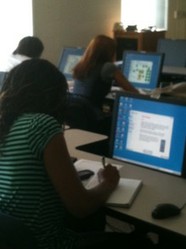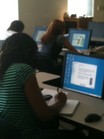There are growing opportunities for individuals seeking adjunct faculty positions, yet many applications get rejected because the job seeker neglected some of the fundamentals necessary for employment in HigherEd, including a lack of bona fides (no published work), poor or absent digital profile or portfolio, and little to no effective networking. This article covers these areas and more, and would be ideal for anyone with a degree, who was seeking to teach in the HigherEd job market.

Landing an Adjunct Faculty Job in HigherEd
by eumatthe
This article provides some foundational knowledge for individuals interested in teaching as an Adjunct Faculty in a Higher Educational Institution.
Into the HigherEd Job Market
The steps to successful employment in breaking into the world of education in some ways mirror those of employment in the traditional sense. Outlined here are some common foundational steps for someone considering adding adjunct or part time work in the field of Higher Education (HigherEd). Becoming a fulltime educator requires more steps, but those interested could get a good start by following these steps as well.
Each step is presented with the rationale, and when appropriate, some links to appropriate websites and other resources. Although the manner in which each step should be approached is presented in a logical sequence, they are not prescriptive for every job seeker. The only assumption that is made is that the job seeker has an advanced degree (B.S., M.S, M.A., etc.,), which they have an interest in leveraging into an educational job opportunity.
Although not intended to be an all-inclusive explanation for every aspect of entering the field, the process provided below should sufficiently address the essentials of “how to.” Lastly, the steps below are presented in first person in order to more personalize the experience and expectations of the job seeker.
Establish (re-establish) Bona Fides (the simple approach)
Since we possess an advanced degree, the assumption is that we are working within a field that complements our degree area; however, that may not be the case. Because we tend to migrate from one employment opportunity to the next, it is not uncommon that we are not actively working within our degree field. As a result, we must establish or re-establish our expertise and authority in the field. This is not to suggest that we become an expert, but rather that we possess current transferable knowledge.
Previously Published Work
One of the simplest ways for doing this is to reach into our past and dig out our Bachelor Final Project, or Master’s Thesis or Final Project and use it as a start point.
Review your previous work and then search the Internet for similar projects or activities [try http://www.duckduckgo.com as well as Google Scholar], you can cite this work in the article you are about to compose.
Next, if you have not published your work previously use one or more of the following publication outlets to publish your article for the first time. If you have published your work previously, consider revising and updating your work and re-publishing an update in one or more professional journals or trade magazines.
For Non-Published work try:
Academia Journals (https://www.academia.edu/journals) Open access publishing also enhances the visibility of authors' work and facilitates improved scholarly communication, thereby increasing its potential impact. Research has shown that open access articles typically attract 1.5x more citations, 3x more views, and over 85% more downloads*, compared to articles published behind a paywall.
Social Science Research Network[SSRN] (https://hq.ssrn.com/login/pubSignInJoin.cfm) This is a repository for working papers and preprints in the social sciences, humanities, and other disciplines. SSRN can help extend your reach and impact by featuring your research. They will work with you to assemble your research as an eJournal and make it accessible to their community of users. SSRN defines research broadly: PPTs, infographics, case studies, white papers, proceedings, and working papers.
Because you will have articles relevant to your area of expertise published under your name, you will have started the process of establishing yourself as an authority. Admittedly, while many institutions look for published work in peer reviewed journals, and other professional publications, your aim is not to overwhelm potential employers with your authorship ability, but rather alert them to the fact that you are and remain current within the field.
You will be amazed at how many job applications in HigherEd inquire as to whether you have authored any articles, papers, books, etc. They are looking to get a “feel” for you before investing any effort in bringing you in for an interview. Remember that you only get one chance to make a first impression, even in the digital world so you don’t want to squander it. As a reminder, if you have a Facebook account or other public accessible social media accounts, you should ensure that everything that you have visible or accessible, is not something that might disqualify you from getting an interview.
Establish Bona Fides (the more challenging approach)
If you have been working outside of your degree for an extensive amount of time, or if your degree has little to do with the area you wish to pursue teaching, then the process will be more challenging. Let’s suppose you have a degree in History, but you want to teach at a college that focuses on degree areas such as welding, engineering, criminal justice, etc. You need to be reasonable regarding what you know your capabilities to be, and then look just beyond them to your possibilities.
For example, how would history play a role in engineering? The basis of much of today’s engineering was culled from the historical contributions made by like-minded thinkers. As a history major, your niche could be in teaching the fundamentals or foundations of engineering, something like that. For criminal justice and similar areas, look at how you might use your knowledge of history and your experience in researching historical facts to determine whether you could “get your foot in the door” by teaching a 100 or 200 level introductory course.
Another way to improve your resume is by improving your portfolio. If you have taken 18 – 24 hours in a specific subject, such as accounting or advanced math, then many institutions will recognize you as meeting the standards necessary to teach in that area. So take some classes online, or at a local university and beef up your portfolio.
Lastly, there is a growing trend of free education offered by some prestigious universities in the form of Massive Open Online Courses (MOOCs), as well as similar offerings that anyone can take advantage of and hone their skills, or attain new ones. The caveat is that most of these schools do not offer transferable college credit for taking the free courses, and all are online with sometime little to no instructor interaction. Another alternative that is in line with MOOCs, but offers free certification courses is Alison (http://alison.com/) a collection of topical areas of interest in which Mike Feerick, CEO & Founder provides free learning.
Establish or Revise Your Digital Profile and Network
You may possess several degrees and feel superbly confident that you could present teaching material in a classroom, so why aren’t you hired yet? Could be that no one knows you’re looking for additional work, or that you are available. The best resume or CV in the world is worthless if no one sees it, so take a look at what you look like online. Google your own name, and see what shows up.
Don’t be discouraged if you find little about yourself on the Internet – it’s common, but here’s how you can safely, responsibly, and professionally change that; networking. I’m not talking about schmoozing on the golf course, or at the local watering hole; but rather seeking professional online forums and joining the conversation. Yahoo Groups used to have a decent reputation, but has been outstepped by LinkedIn and other similar groups.
Note: Facebook (Meta) still has some legitimacy in the professional world however, if you’re looking to connect with a group of professional who are already in the workspace you are interested in joining – LinkedIn and other contemporary groups is a better option.
Your email says a lot about you – sometimes more than you expect. Instead of using the same email you’ve had since Hotmail went live, consider a simple free email option, such as Gmail, with your name or a slight variation, i.e.; [email protected] or something simple. Direct all your job search queries here, rather than your current employers email.
Visit online job offering sites such as HigerEdJobs.com and similar offerings. You may find some offerings on MonsterJobs.com, but the more targeted your search, the more likely you will be to find employment in an area you are looking for.
Lastly, ensure you add a recent photo of yourself (headshot) in your profiles, and ensure that your information is spell-checked, grammatically correct, and current. Unofficial studies have disclosed that more people are contacted for interviews or at least follow-up questions when there is a face to put with a name. It should go without saying that the photo be simple and professional…and smile.
Apply Only if You’re Serious
Few things annoy potential employers more than to take the time to read through the resume stack, applications, and supporting documentation (transcripts, certifications, etc.) only to discover that the job seeker was just “checking to see what was out there.” This is a quick and easy way to get blacklisted and never even know it! So don’t paper the Internet with your resume and job applications, unless or until, you are ready to commit.
I realize that these few steps have only laid the groundwork, or foundation for possible employment in the field of HigherEd, and that there is much more that could be written about the process, including identifying your strengths or proficiency with technology, whether to teach in the classroom or online, whether to teach for a private or public institution, and of course at what levels.
As I explained at the beginning, this was not designed to be an all-inclusive and all-encompassing missive on HigherEd employment, but rather a quick, down and dirty “how to” reader, for the person looking for work now! I hope that I have achieved my goal, and wish you luck and good hunting in your job search.
___________________________________________
About the author
Dr. Eugene Matthews is a Criminal Justice Faculty and Law Enforcement Academy Trainer at the Arapahoe Community College. He has taught leadership workshops, and presented on various topics of interest. He has authored and published several articles and his books on Leadership and Mentoring can be found in Amazon Kindle books. He can be reached for questions and comments at [email protected].
You might also like
Online Psychology Degree: Practical Study TipsPractical tips for success in your online psychology degree.
Top Online Fashion Schools in the USLearn about the different schools and colleges in the US which offer online d...










 How to create a Job-Based E-Folioon 02/21/2014
How to create a Job-Based E-Folioon 02/21/2014
 The Mechanics of Thinking: "How to think, by asking Why."on 08/29/2013
The Mechanics of Thinking: "How to think, by asking Why."on 08/29/2013
 Endless Possibilities with Paper.li (A Review of Curated Publishing)on 06/18/2013
Endless Possibilities with Paper.li (A Review of Curated Publishing)on 06/18/2013
 Leadership is More than a Metaphoron 06/11/2013
Leadership is More than a Metaphoron 06/11/2013



Comments
Some great tips! Thank you for the article!
That's a really helpful guide on how to establish your credentials